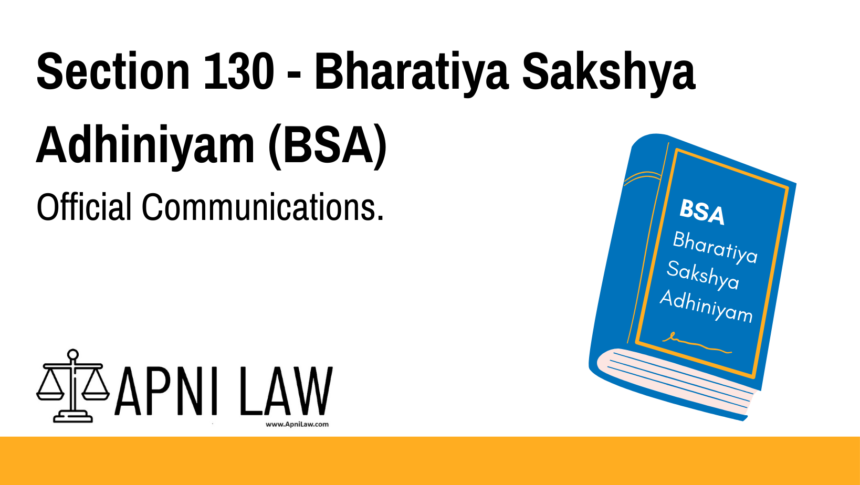Code: Section 130 BSA
No public officer shall be compelled to disclose communications made to him in
official confidence, when he considers that the public interests would suffer by the disclosure
Explanation of Section 130 BSA
Section 130 of the Bharatiya Sakshya Adhiniyam, 2023, provides a legal privilege to public officers with respect to confidential communications they receive in their official capacity. This section ensures that public officers are not compelled to reveal information that they believe, in their discretion, would harm the public interest.
This provision acknowledges that certain communications, when disclosed, may disrupt the functioning of public offices or compromise national security, governance, or policy-making. It aims to preserve the integrity of sensitive government affairs by protecting officials from being forced to divulge confidential matters in court or other legal proceedings.
Key Provisions:
- Public officers are not compelled to disclose communications made to them in official confidence.
- The officer must consider that public interest would suffer if the communication is disclosed.
- The section emphasizes the officer’s discretion in deciding whether the disclosure would harm the public interest.
Illustration
Example 1: Government’s Confidential Policy Advice
A public officer receives confidential advice from a colleague regarding an upcoming policy decision. If the officer is asked to disclose this advice during legal proceedings, they are protected from being compelled to do so if they believe the disclosure would negatively affect public interests, such as undermining the policy process.
Example 2: National Security Information
A public officer in the Ministry of Defence is asked to disclose confidential military strategies in a criminal case. The officer can refuse to disclose the information by invoking Section 130 if they believe revealing the details would compromise national security.
Common Questions & Answers on Section 130 BSA
1. Can any public officer refuse to disclose communications under Section 130?
Yes, if the officer believes that disclosing the communication would harm the public interest.
2. What does “public interests would suffer” mean in this context?
It refers to potential harm that could occur to government operations, national security, policy-making, or any other aspect of governance if the communication is revealed.
3. Does Section 130 apply to private citizens?
No. This section specifically applies to public officers acting in their official capacity.
4. Can a public officer be forced to disclose communications if a court orders it?
No. Section 130 protects public officers from being compelled to disclose such confidential communications, even with a court order, as long as the officer considers the public interest would suffer from such disclosure.
5. What kind of communications are protected under Section 130?
Communications made to public officers in official confidence, particularly those relating to government policies, national security, or other sensitive matters that, if disclosed, could harm the functioning of public institutions.
Conclusion
Section 130 of the Bharatiya Sakshya Adhiniyam strikes a balance between the need for transparency and the necessity of protecting sensitive information that could negatively impact public interests if disclosed. By shielding public officers from being compelled to reveal confidential communications, this provision safeguards the integrity of government operations and preserves national security and public policy. It empowers public officers to act in the best interest of the State without fear of legal repercussions for maintaining confidentiality.
For more insights on legal provisions related to official communications and public interest, visit ApniLaw.












